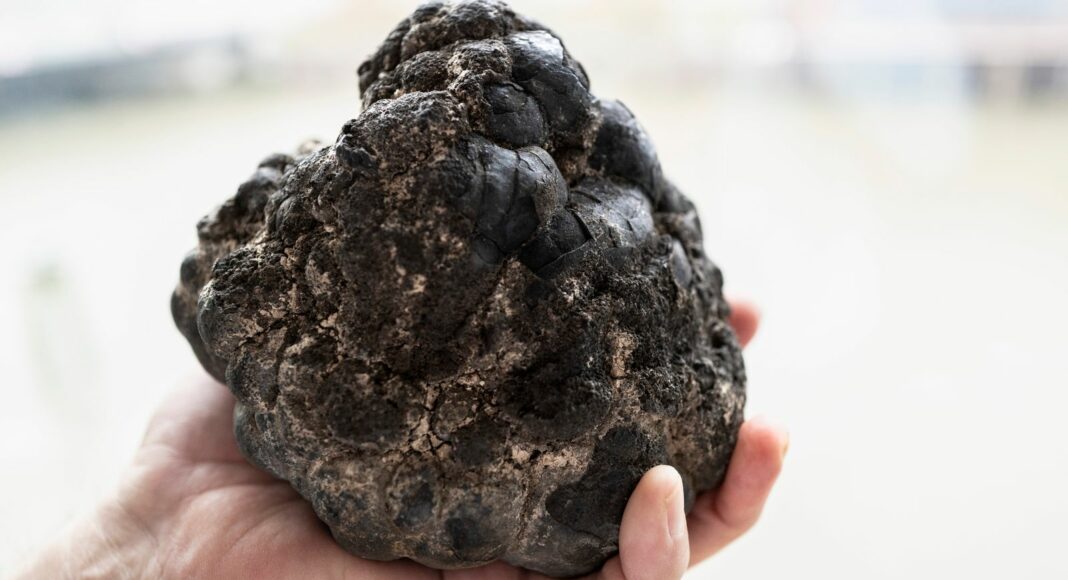A company has said it intends to start mining minerals from the deep sea bed despite an international meeting failing to grant permission.
Parts of the ocean floor are rich in so called “poly-metallic nodules” containing elements like nickel and copper, which are essential to green tech and renewable energy.
Canadian firm The Metals Company is aiming for a licence next year for mining in part of the Pacific Ocean, possibly starting production as early as 2025.
These nodules look like a lump of coal and are spread across some of the abyssal plain in their trillions.
Image:
Pic: AP
They form as metals dissolved in seawater like nickel, copper, manganese and cobalt aggregate around a particle and grow over millions of years.
They are key elements in our increasingly electrified future, vital for electric cars, batteries and turbines – so we will need to find a lot more.
The Metals Company has been exploring an area between Mexico and Hawaii, pulling up nodules from around 4,000m deep.
Image:
The mining process of nodules
If it mines commercially, it plans to use a tracked vehicle around half the size of a house to wash the nodules off the sea bed before sucking them up a pipe to a vessel above.
But the deep sea bed is one of the few remaining untouched ecosystems, where science is only just discovering much of its extraordinary biology and the mining process will destroy some habitats.
Read more: ‘Gold rush’ warning over plans to mine precious metals in deep seaDeep sea mining risks ‘irreversible’ damage to oceansThe challenges of getting to a net zero world
Image:
Poly-metallic nodules are essential to green tech and renewable energy
The Metals Company does not deny there will be some ecological impact but claims it will be far less than the harm done by current land based mining of those metals – much of which come from the rainforests of Indonesia and the Democratic Republic of Congo.
“We should be carrying out extractive industries in parts of the planet where there is the least life, where there is no alternative use, as opposed to parts of the planet where there is the most life and where people are living,” said Gerrard Barron, The Metals Company’s chief executive.
“There are no plants there [on the abyssal plain], zero flora. And if you measure the amount of fauna per square metre, there’s around 10g of living matter per square metre.
“Now compare that with the alternative to these, which is rainforest nickel, which has around 30kg per square metre.”
Spreaker
This content is proed by Spreaker, which may be using cookies and other technologies.
To show you this content, we need your permission to use cookies.
You can use the buttons below to amend your preferences to enable Spreaker cookies or to allow those cookies just once.
You can change your settings at any time via the Privacy Options.
Unfortunately we have been unable to verify if you have consented to Spreaker cookies.
To view this content you can use the button below to allow Spreaker cookies for this session only.
Enable Cookies
Allow Cookies Once
Click to subscribe to ClimateCast with Tom Heap wherever you get your podcasts
But a recent meeting of the International Seabed Authority (ISA) ended with no agreement over licencing deep sea mining, as 21 countries called for either a temporary or permanent halt.
Some of the big companies who might be customers for these metals like VW, Volvo, Samsung and Google also support a moratorium on seabed extraction and say they would not buy them.
“There are so few ecosystems that are untouched by human and industrial impacts…. we need to keep these ecosystems intact,” said Louisa Casson, the global project leader for Greenpeace’s Stop Deep Sea Mining campaign.
“You have octopuses that are laying eggs on the sponges that can be found on these nodules. We’re talking about whipping up clouds of sediment and potential pollution… that could have a really disturbing impact, not just on the deep seafloor, but throughout the water column.”
Watch The Climate Show with Tom Heap on Saturday and Sunday at 3pm and 7.30pm on Sky News, on the Sky News website and app, and on YouTube and X (formally known as Twitter).
Or listen to ClimateCast wherever you get your podcasts.
The show investigates how global warming is changing our landscape and highlights solutions to the crisis.




